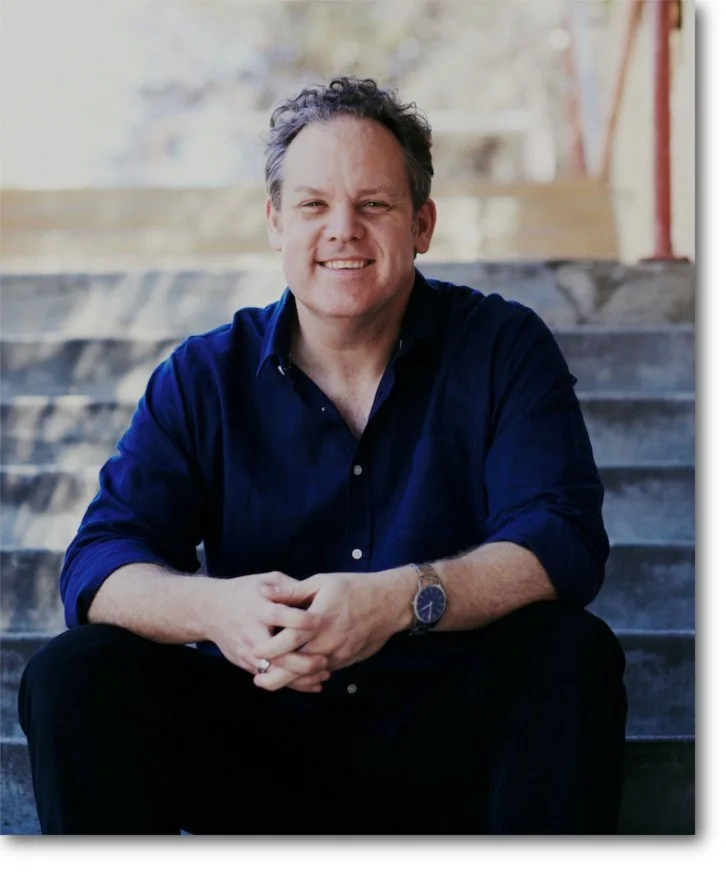Photo: Leah Jing McIntosh
The Mountains
Laurie Steed
I’m not sure my father-in-law likes me.
I get this information from various interactions, including our first meeting, where he grilled me like a detective might interrogate a murder suspect. Now that I’m a dad, I understand this a bit more, yet I will still never know what it is like to:
a) have a daughter and,
b) find she’s fallen for a total doofus.
My wife is originally from Mumbai and of the Parsi faith. I was born in New Zealand in a city known primarily for its black beetle plagues. From there, I moved to Australia when I was nine, and, in time, deep dove into the world of the relaxed and the lackadaisical.
Her parents likely greeted my arrival at their family home the way one might greet a door-to-door salesman – with fear, trepidation, and the hope that they would not be ripped off. Over time, her parents and I warmed to each other as might a cat and a dog in the same home, but ultimately we have always been less strawberries and cream, and more sausage rolls and Kulfi.
There were also adjustments on our side of the fence – between myself and my wife. When I moved to Melbourne and my wife stayed in Perth, we were not supposed to be cohabitating; she was in my state and I in hers.
But we found novel ways around this. I would not speak when she was on the phone. I would flush the toilet. If I used a mug, I would put it in the dishwasher. Not exactly James Bond skills there, and thankfully they never visited when I was staying, or I would have had to hide in the cupboard.
We would send them pictures as we lived on one side of Australia, with them on the other. One time, we sent a close-up selfie of us from the Dandenong Ranges. Above the attachment, as if attempting to define the undefinable, we wrote simply ‘the mountains’.
Even then, our union was more complicated for her than it was for me. Her parents wanted her to be happy, safe, and financially secure. My parents wanted this for me too, but their thoughts came out more like, ‘Well, you take care now’.
— —
The mind of a Parsi father whose daughter, once a little girl, and now a strong, forthright, and independent woman, most likely works something like this,
I hope she’s safe.
I hope she’s warm.
I hope she’s not worried about money.
I hope she’s not hungry.
I hope she has friends.
I hope one day she finds a lovely man (or woman, I don’t think my father-in-law is all that worried which) and that one day, she makes a family of her own.
I hope that she has shut the garage door.
I don’t know why but closing the garage door is incredibly important to my father-in-law. I’ve received texts and calls about it. On more than one occasion, I have gone outside, only to find him pressing the button. He was never apologetic and occasionally accusatory, or perhaps I just felt guilty for not worshipping the up-down magic of our garage entry point as much as him.
So, imagine you loved someone as much as he loves his daughter. Imagine the highs and lows he’s already travelled with her. Imagine the safety, security, and companionship you’ve prayed into being.
Then imagine she marries outside of her religion to a writer (one of the five swear words of productive society – with the others being poet, actor, dancer, and creative entrepreneur). Not only that, imagine that this writer does not even close the garage door.
Honestly, I’m surprised he never punched me in the face.
So, in time I began a merry dance of differing priorities. At first, I put on the workman’s shoes of my father-in-law, found gainful employment in state government. Oh, the approval that followed. Seeing his nods felt like chocolate to me; I could never get enough. One time, he wanted to talk about taxation, and I almost asked for a photo of the two of us at the dinner table, so that I could label it as ‘appreciation’ in my mind.
It wasn’t to last. I hated my government job. I ate enough of my feelings to gain nearly thirty kilos, and I would sometimes go to the toilet just for something to do. I didn’t know what my job was and neither did anyone else. So, while there were moments of transcendence on this walk of approval, there was no one there for the most part; no one, that is, except for my father-in-law. He walked a step or two back, keeping watch, forever looking out for loose ground or an opening of the skies.
We walked the mountains of my marriage, with half-a-nod from him to me. The birth of my first son brought a stare of apprehension in my direction. My government job, not so much a nod as a knighthood in the family lore; a writer who had finally found a family, and the words to say goodbye to all that. Then, with the birth of my second son, came his sneaking realisation that I was not that bad a dad, whatever else my shortcomings.
One time, after the birth of our second son, my father-in-law asked, ‘How are you going?’
I said, ‘I’m finding it really hard.’
I went to continue, but he said, ‘No, not you. I am asking about the boys.’
I laughed, and in time noted a more significant suggestion; that whatever else was going on, being a dad should not be solely about me.
— —
When the contract ended on my government job – somehow they’d worked out my role was useless while retaining the other useless cogs within the department – my wife suggested we not mention I had lost my job. This led to a worrying few months in my life, where I wore button-up shirts, trousers, and dress shoes on every drop-off and pick-up. While this helped my productivity while setting up my own business, it also hurt my self-esteem, igniting doubts that my writing, mentoring, and manuscript assessments were not real work, just a phase to be worked through until I found a real job.
Only, I wanted to make my passion a job. Despite all the collective wisdom that might suggest otherwise, I thought I could love what I do – make it work for me – and in time be loved and accepted for exactly who I was; nothing more, nothing less.
We never talked about this. I feared, perhaps, that he might see the joins between my logic and my selfishness, and wonder which was winning.
— —
My favourite conversations with my father-in-law are not actual conversations, but us sitting together in a room with the boys playing wildly, desperate to include either one, or both of us, in a board game, puzzle, or game of hand tennis. He’s older these days, but my father-in-law still lights up around my boys, and it’s clear there are some things on which we will always agree. One being that our boys are precious and if we ever feel stressed, exhausted, or lonely, we need only reach outside of ourselves and gaze on in awe at these tiny, magical creatures of joy and wonder.
I do not talk of these shared truths with him. He’s of another generation of men, one that knows much but feels little. In his own life, he raised his siblings practically on his own, working jobs for the pay and not the passion – he’s well known for his time putting paint on soft-drink cans – and always putting his kids before himself. I must seem quite confronting, even selfish, with my dreams of publication, recognition, and readership.
He’s wiser than me in many ways. He knows his way around the world of property, assets, and financial management. He’ll sit with me as one might sit down a troublesome child. He explains how parenting works, not in the emotional realm, but the kingdom of savings, investments, and building a nest egg for my boys so that they never have to worry about money. What would I say to him if I were brave enough?
I’ve never known this stuff.
I wish I knew this stuff.
I hear what you are trying to teach me. I want to learn it. To be better, more intelligent. To just this once, be enough, and be proud of that fact.
I think each talk of ours is just a way for you to say, ‘Take care of yourself, and my child, and her children too. We love you, and we want you to be safe.’
It is hard to be a new kind of man around someone like him. More challenging to know that my knowledge of self dictates both my children and me as clear priorities. My boys can have ninety-nine per cent, but I must retain that final one per cent or risk falling back into destructive patterns, obsessive thoughts, or past trauma and related shutdowns – or worse, a kid in grown-up’s clothing.
In time, my wife tells her parents I have left my government job. That I’m building a business out of words; assessment, mentoring, and writing when time permits. There’s no grand conversation or need to bring me in. Just the assumption that I’ve finally got this; that, in seeing me with my boys, and spending time looking after them, and trusting I would never start a passion project I could not meaningfully complete, they have accepted my flawed but viable reality. I’m not sure they like it, necessarily, but now we see the mountains as they rise before us and are happy to walk them together. It’s an agreement to tackle both the highs and the lows. A space where we’ve agreed to be better for my boys.
‘You are both excellent parents. I see from the way the boys light up to greet you. The hugs they give before you leave them with us,’ he tells me. ‘And in the photos, all those photos…You’re raising great kids.’
I don’t tell him this is all I’d ever wanted to show him. That my wife and I spend nights talking about our boys, gauging approaches, rethinking strategies. How I am in awe of his daughter – my wife – and the way she takes care of our kids. How she sits with them, actively joining in with their games; how she insists on no books or devices at dinner time. How she, like her father, has a knack for knowing how to make a child feel loved.
When sneaking into their rooms to check on them before bed, we see the strength we got from our folks; being kind, present, watching; and how it helped us be brave when wanting only to collapse.
I don’t ask my father-in-law, although I’d love to know if he did that same thing. His son and his daughter, tiny tadpoles in their respective beds. Him watching from the door, feeling full, blessed, hoping he would be enough.
I take photos of both my mother-in-law and my father-in-law when they least expect it. Catch their joy at Josh, full giggle, or Noah cuddling up, the way he only does when he knows he can trust the person. Extraordinary days, with time, stretched out across the room. Knowing this will pass. That the words of wisdom, the sheer compassion of them both, is not a constant. Seeing peaks out in the distance that we’ll have to climb ourselves – feeling grateful that, for now, we still have our Sherpa.
In Tibet, children present a Hada (a white, woven scarf that symbolises purity and loyalty) to their parents when visiting. Here in Kingsley, it’s all out of whack. My in-laws drop off rotis, strawberries and raspberries, an orchard of fruit, so my boys can often ask and always receive. On average budgets, we seek our types of Hadas for these elders who take care of us – dim-sum breakfasts, buffet lunches, afternoon teas with cupcakes baked by the boys, tiny trips from our house to theirs and vice-versa – grateful that we fought our cultural differences, had them trumped by safety, support, and the shared journey of raising our boys.
— —
It’s ten o’clock on a Sunday morning when my phone buzzes. It’s a text from my father-in-law, a lull in the day’s mountain climbing, and an essential dispatch from base camp.
Your garage door is open.
I head outside, press the button on the garage wall. Hear the creak of rolling metal headed to the ground.
Walk inside, and gaze out of our bedroom window. A storm coming in, it seems. Perth’s forever rolling in and out. Greys gate-crashing spring, bringing rain that swirls from gusty winds.
I pick up my phone and text, Thanks.
I would like to say much more, but for now, it’s enough. An agreement of sorts to have each other’s back as we do our best to find a shared path.
Laurie Steed is intent on finding a deeper connection to life through the written word and helping as many people as he can to do the same. The author of You Belong Here (2018) and editor of Shibboleth and other stories (2016), his work has been featured on BBC Radio 4 and in collections including Best Australian Stories, Award Winning Australian Writing, The Review of Australian Fiction, The Age, Meanjin, Westerly, Island, and The Sleepers Almanac. Read more about Laurie.
Photo: David Henry Photography




